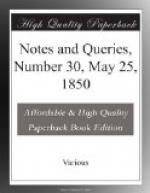Mr. Cunningham states, we dare say correctly, that Sheridan died at No. 17 Saville Row. We thought he had died at Mr. Peter Moore’s, in Great George Street, Westminster. Was he not living there shortly before his death? and did not his funeral at Westminster Abbey proceed from Mr. Moore’s?
* * * * *
ON A PASSAGE IN MACBETH.
If any of your correspondents would favour me, I should like to be satisfied with respect to the following passage in Macbeth; which, as at present punctuated, is exceedingly obscure:—
“If it were done, when ’tis
done, then ’twere well
It were done quickly: If the assassination
Could trammel up the consequence, and
catch,
With his surcease, success; that but this
blow
Might be the be-all and the end-all here,
{485}
But here, upon this bank and shoal of
time,—
We’d jump the life to come.”
Now, I think by altering the punctuation, the sense of the passage is at once made apparent, as thus,—
“If it were done when ’tis
done then ’twere well.
It were done quickly, if the assassination
Could trammel up the consequence, and
catch,
With his surcease, success, that but this
blow
Might be the be-all and the end all here,”
&c.
but to make use of a paradox, it is not done when it is done; for this reason, there is the conscience to torment the evil-doer while living, and the dread of punishment in another world after death: the “bank and shoal of time” refers to the interval between life and death, and to “jump” the life to come is to hazard it. The same thought occurs in Hamlet, when he alludes to—
“That undiscovered country, from
whose bourne
No traveller returns.”
But that is clear enough, as in all probability the annotators left the passage as they found it. I have not the opportunity of consulting Mr. Collier’s edition of Shakespeare, so that I am unaware of the manner in which he renders it; perhaps I ought to have done so before I troubled you. Possibly some of your readers may be disposed to coincide with me in the “new reading;” and if not, so to explain it that it may be shown it is my own obscurity, and not Shakespeare’s, with which I ought to cavil.
I have witnessed many representations of Macbeth, and in every instance the passage referred to has been delivered as I object to it: but that is not to be wondered at, for there are professed admirers of Shakspeare among actors who read him not as if they understood him, but who are—
“Full of sound and fury, signifying nothing.”
G. BLINK.
* * * * *
MINOR QUERIES.




